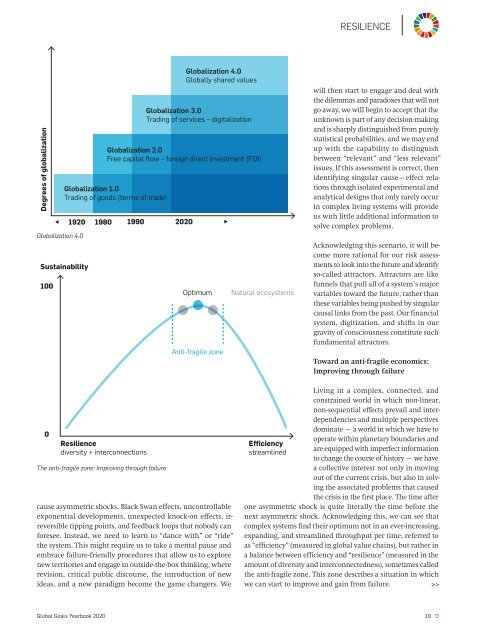Planet under Pressure
The 2020s are the make-or-break decade for Sustainability. But Covid-19 questions almost everything. How can we handle increasingly frequent shocks? What can a resilient society and economy that is in line with planetary boundaries look like? These and many other questions are discussed in the new 2020 edition of the Global Goals Yearbook titled “Planet under Pressure”. The Yearbook supports the UN Sustainable Development Goals and is one of the publications in strong international demand.
The 2020s are the make-or-break decade for Sustainability. But Covid-19 questions almost everything. How can we handle increasingly frequent shocks? What can a resilient society and economy that is in line with planetary boundaries look like? These and many other questions are discussed in the new 2020 edition of the Global Goals Yearbook titled “Planet under Pressure”. The Yearbook supports the UN Sustainable Development Goals and is one of the publications in strong international demand.
Create successful ePaper yourself
Turn your PDF publications into a flip-book with our unique Google optimized e-Paper software.
RESILIENCE<br />
Degrees of globalization<br />
Globalization 1.0<br />
Trading of goods (terms of trade)<br />
Globalization 4.0<br />
Globally shared values<br />
Globalization 3.0<br />
Trading of services – digitalization<br />
Globalization 2.0<br />
Free capital flow – foreign direct investment (FDI)<br />
◄ 1920 1980 1990 2020 ►<br />
Globalization 4.0<br />
Sustainability<br />
100<br />
Optimum<br />
Anti-fragile zone<br />
Natural ecosystems<br />
will then start to engage and deal with<br />
the dilemmas and paradoxes that will not<br />
go away, we will begin to accept that the<br />
unknown is part of any decision-making<br />
and is sharply distinguished from purely<br />
statistical probabilities, and we may end<br />
up with the capability to distinguish<br />
between “relevant” and “less relevant”<br />
issues. If this assessment is correct, then<br />
identifying singular cause–effect relations<br />
through isolated experimental and<br />
analytical designs that only rarely occur<br />
in complex living systems will provide<br />
us with little additional information to<br />
solve complex problems.<br />
Acknowledging this scenario, it will become<br />
more rational for our risk assessments<br />
to look into the future and identify<br />
so-called attractors. Attractors are like<br />
funnels that pull all of a system’s major<br />
variables toward the future, rather than<br />
these variables being pushed by singular<br />
causal links from the past. Our financial<br />
system, digitization, and shifts in our<br />
gravity of consciousness constitute such<br />
fundamental attractors.<br />
Toward an anti-fragile economics:<br />
Improving through failure<br />
0<br />
Resilience<br />
diversity + interconnections<br />
The anti-fragile zone: Improving through failure<br />
cause asymmetric shocks, Black Swan effects, uncontrollable<br />
exponential developments, unexpected knock-on effects, irreversible<br />
tipping points, and feedback loops that nobody can<br />
foresee. Instead, we need to learn to “dance with” or “ride”<br />
the system. This might require us to take a mental pause and<br />
embrace failure-friendly procedures that allow us to explore<br />
new territories and engage in outside-the-box thinking, where<br />
revision, critical public discourse, the introduction of new<br />
ideas, and a new paradigm become the game changers. We<br />
Efficiency<br />
streamlined<br />
Living in a complex, connected, and<br />
constrained world in which non-linear,<br />
non-sequential effects prevail and interdependencies<br />
and multiple perspectives<br />
dominate – a world in which we have to<br />
operate within planetary boundaries and<br />
are equipped with imperfect information<br />
to change the course of history – we have<br />
a collective interest not only in moving<br />
out of the current crisis, but also in solving<br />
the associated problems that caused<br />
the crisis in the first place. The time after<br />
one asymmetric shock is quite literally the time before the<br />
next asymmetric shock. Acknowledging this, we can see that<br />
complex systems find their optimum not in an ever-increasing,<br />
expanding, and streamlined throughput per time, referred to<br />
as “efficiency” (measured in global value chains), but rather in<br />
a balance between efficiency and “resilience” (measured in the<br />
amount of diversity and interconnectedness), sometimes called<br />
the anti-fragile zone. This zone describes a situation in which<br />
we can start to improve and gain from failure.<br />
>><br />
Global Goals Yearbook 2020<br />
19
















